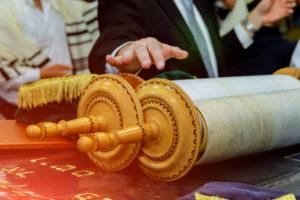
By Rabbi Alan Iser
Parshat Ki Tissa
In this week’s Torah portion, God threatens to destroy the entire nation of Israel for the sin of worshipping the Golden Calf. Moses intercedes and convinces God not to carry out that destructive plan, and God renounces the punishment.
Later in his dialogue with God, Moses asks God to forgive the people’s sin, but if not, God should “blot me out from Your book” (Exodus 33:32). Did God really intend to destroy the entire nation? Why is Moses offering to give up his own life?
Let me provide an answer to the second question first.
Rabbi Kalonymous Kalman Shapira, the last Chasidic rebbe alive in the Warsaw Ghetto, in his collection of sermons delivered in the ghetto, “Aish Kodesh” (Holy Fire) explains that a person who is willing to sacrifice his life to save a fellow Jew is greater than someone who gives their life for the sake of God alone. (I would expand this to include saving the life of any human being.)
In a metaphor Rabbi Shapira relates, the former is like someone who gives their life to save the king’s son. Their love for the king is so great that they are willing to give up their life, not only for the sake of the king, but also for the king’s son.
When Moses saw that the people were in need of mercy, he was prepared to sacrifice his life for the Jewish people, who are the children of God, out of his love for both the people and God. God, in turn, was aroused by Moses’ love to love and be merciful to the people he was leading.
Some commentators see God’s angry threat as deliberately testing Moses as a leader.
First, God refers to the people as “your people” while informing Moses of the events that occurred at the bottom of Mount Sinai, as if challenging Moses to assume his responsibility for the people. Then when God says, “Let Me be, that My anger may blaze forth against them and I may destroy them and make you a great nation” (Exodus 32:9), God is providing Moses with an opening to plead his case and dissuade God. The midrash asks why does God need to say “leave me alone”?
Was Moses holding God back? Rather, it is like a king telling his son’s tutor, let me alone so I can hit and punish my child. The king doesn’t need the tutor’s permission but is sending a message for the tutor to restrain him. In our case, Moses takes the hint and intercedes.
Indeed, in a daring recreation of this conversation, another rabbinic passage has Moses grabbing hold of God like a person grabbing a friend’s garment and saying, “Master of the Universe, I am not leaving You alone until you forgive them” (Brachot 32a).
This story illustrates why Moses is known in Jewish tradition as “Moshe Rabbeinu,” or Moses, our teacher. As the ideal leader, he does not shrink from the burden of leadership. In a time of crisis, he defends the people and puts the needs of others before his own needs and desires to the point of laying his life on the line.
Our sages also portray the opposite of this kind of leadership in a predictive curse. In the future, they say, your leaders will be like dogs, sniffing the wind to see which way to go.
May we merit to have leaders like Moshe Rabbeinu.
Rabbi Alan Iser is an adjunct professor of theology at St. Joseph’s University and St. Charles Borromeo Seminary and also teaches at the Conservative Yeshiva in Jerusalem. The Board of Rabbis of Greater Philadelphia is proud to provide diverse perspectives on Torah commentary for the Jewish Exponent. The opinions expressed in this column are the author’s own and do not reflect the view of the Board of Rabbis.





